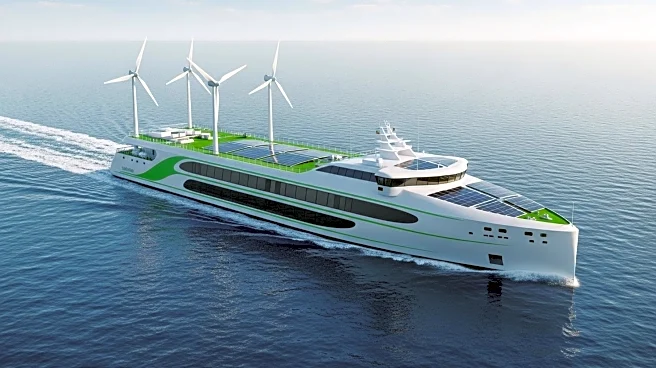What's Happening?
Leading green fuel producers, including European Energy, Liquid Wind, ET Fuels, HIF Global, and Zero Waste, are advocating for the International Maritime Organization (IMO) to adopt the Net Zero Framework (NZF) for shipping. This framework, agreed upon earlier this year, aims to set the maritime industry on a sustainable path by promoting the use of hydrogen-based e-fuels, which offer significant emissions savings compared to LNG and biofuels. The producers are calling for specific incentives to support green e-fuels, as they currently face competitive disadvantages against cheaper, unsustainable options like fossil gas and first-generation biofuels. The IMO delegates are meeting in London this week to discuss the adoption of the NZF, with a final vote expected soon.
Why It's Important?
The adoption of the NZF by the IMO is crucial for the decarbonization of the shipping industry, which is a significant contributor to global emissions. By providing incentives for green e-fuels, the framework could accelerate the transition to sustainable shipping practices, benefiting environmental goals and reducing reliance on fossil fuels. This move could also stimulate investment in green fuel projects worldwide, creating economic opportunities and fostering innovation in the renewable energy sector. However, without targeted incentives, the energy transition in shipping risks stalling, which could have negative implications for global efforts to combat climate change.
What's Next?
The IMO delegates are expected to vote on the adoption of the NZF later this week. If approved, the framework will require implementation strategies and policy adjustments to ensure the effective promotion of green e-fuels. Stakeholders, including governments and industry leaders, will need to collaborate to establish the necessary incentives and infrastructure to support the transition. The outcome of the vote will likely influence future regulatory measures and investment decisions in the maritime sector.
Beyond the Headlines
The push for the NZF highlights the broader challenge of balancing economic interests with environmental sustainability in the shipping industry. The reliance on cheaper fossil fuels and biofuels underscores the need for policy interventions to level the playing field for green technologies. The successful adoption of the NZF could serve as a model for other industries seeking to reduce their carbon footprint, emphasizing the importance of international cooperation and policy certainty in achieving global climate goals.










